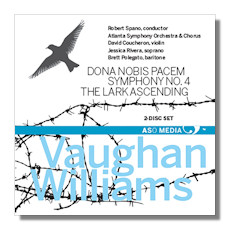
The Internet's Premier Classical Music Source
Related Links
- Vaughan Williams Reviews
- Latest Reviews
- More Reviews
-
By Composer
-
Collections
DVD & Blu-ray
Books
Concert Reviews
Articles/Interviews
Software
Audio
Search Amazon
Recommended Links
Site News
 CD Review
CD Review
Ralph Vaughan Williams

- Dona nobis pacem *
- Symphony #4
- The Lark Ascending **
* Jessica Rivera, soprano
* Brett Polegato, baritone
** David Coucheron, violin
* Atlanta Symphony Chorus
Atlanta Symphony Orchestra/Robert Spano
ASO Media CD-1005 2CDs 83m
I might be alone, but I always wondered what Robert Shaw's generally excellent Telarc Dona nobis pacem (Telarc CD-80479 reviewed in 2000 for Classical Net by Mr. Steve Schwartz) would sound like with a firmer hand on the podium. Shaw was of course one of the 20th Century's great choral conductors, but his orchestral conducting – Verdi's Requiem excepted – often left a great deal to be desired. Robert Spano has thus far proved to be equally comfortable with orchestra and chorus, and as his own Telarc efforts show him to be a tremendous Vaughan Williams conductor.
This Dona doesn't disappoint! The Atlanta Symphony Chorus remains one of the very finest in the United States, and Spano and his orchestra are likewise one of America's best kept musical secrets. I don't know how many of Shaw's players and singers remain, but the sense of occasion and commitment found in the earlier reading remains very present. As on the Telarc disc, the choral singing can basically be followed without a score, which is not something you can generally say for the more famous English versions on EMI. Unlike Shaw's Telarc disc, I find the soloists generally direct and thankfully un-heavy. Furthermore, I have always found Spano the more daring conductor, and while his sectional timings are similar to his great predecessor, the music is more texturally interesting, more naturally handled. And while Shaw's disc still threatens to rip a hole in your speakers, I find ASO Media's sound production more realistic, not to mention more in line with Spano's interpretation. Perhaps the late choral conductor makes the big moments feel a touch more impressive, but there is literally nothing else here I find lacking. Well, almost nothing. Did ASO Media have to start "O man greatly beloved" (track six) after the baritone completes that entire section? It seems off to me. Still, this is my new favorite version of the piece.
Since the choral work alone would make less than a LP worth of programming, ASO Media generously includes a powerhouse performance of the same composers' Symphony #4. I confess this is not a work I've paid much attention to, but this recording has everything, great sound, outstanding playing, and a genuine understanding of the composer on the podium. The Atlanta Symphony plays with tremendous conviction, a huge range of dynamics and emotions, and a real game plan, so to speak. Everyone is on the same page; the music seems to organically come out of nowhere as if being composed on the spot. Every single section of the ensemble is worthy of praise, and the pacing feels just right throughout. Spano and his charges arguably outplay Vernon Handley (which rules out Boult automatically, in my book), and they are more naturally recorded than Previn and Slatkin on RCA. That doesn't cancel out the excellence of any of these four great cycles, but this is by far the best Fourth to come from the US, maybe ever.
The program ends with an absolutely lovely The Lark Ascending. Most superstar violinists take the work too slowly; Hahn clocks in at over 16 minutes, Kennedy at a nearly inert 17-plus. David Coucheron has no intention of languishing that much, but still proves quite flexible in terms of phrasing. He plays beautifully, with Spano providing a magnificent backdrop on which to paint melodies. Spano continues to enrich the Vaughan Williams discography, and I have no doubt that Robert Shaw would have been thrilled. Perhaps the only thing you worry about is the current state of the Atlanta Symphony, and how long it will be until we get such a wonderful recording from this ensemble again. But we'll always have this, and it's pretty amazing.
Copyright © 2014, Brian Wigman



















